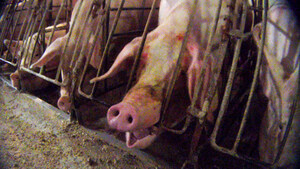Tyson Foods Takes Steps To Improve Chicken Welfare Practices, But More Action Is Needed
Mercy For Animals Urges Tyson to Address Systemic Animal Abuse in Its Poultry Operations
SPRINGDALE, Ark., June 21, 2017 /PRNewswire/ -- Today, Tyson Foods announced it would improve methods for monitoring its suppliers' treatment of animals and also research the meaningful chicken welfare standards more than 40 major food companies have already adopted. Mercy For Animals, whose many investigations of Tyson slaughterhouses and factory farms have revealed shocking animal cruelty, commends Tyson's move to improve monitoring and calls on Tyson to address the enormous animal suffering resulting from the company's standard factory farming practices.
Most animal suffering on factory farms that raise chickens for meat arises from standard practices related to stocking density, slaughter, environment, and low-welfare chicken strains. Today's announcement from Tyson fails to address these problems. Science does not support Tyson's claim that more research into these standards is needed. Decades of scientific research have already concluded that these standards are the minimum necessary to prevent the worst problems affecting broiler chickens in factory farms and slaughterhouses.
All of the nation's largest foodservice companies (Compass Group, Aramark, and Sodexo) and dozens of the nation's leading restaurant chains, among them Subway, Burger King, Chipotle, Panera Bread, Starbucks, Boston Market, Ruby Tuesday, TGI Fridays, Red Robin, Jack in the Box, Shake Shack, Noodles & Company, Le Pain Quotidien, Einstein Bros. Bagels, Sweet Tomatoes, Au Bon Pain, Qdoba, and Pret A Manger, have already adopted meaningful welfare standards to address these issues.
Mercy For Animals urges Tyson to commit to these standards, which are set by international farmed animal welfare certification program Global Animal Partnership. They include a transition to approved breeds with improved welfare outcomes; a reduction in maximum stocking density to provide more space for birds; improvements in growing environments for birds, including litter, lighting, and enrichment; and a multi-step controlled-atmosphere processing system.
Chickens raised for meat are bred to grow so unnaturally fast that they often collapse under their own weight. Many suffer from leg pain so severe they cannot stand and spend nearly all their time sitting in their own waste. Continual contact with wet litter causes extreme feather loss and painful sores on the chickens' bodies and feet. Even breathing can be painful, as the air around the birds is acrid with ammonia and the stench of waste. At slaughter, many are killed by being shackled upside down and having their throats cut open, many while still fully conscious.
"While we applaud Tyson for working to reduce the animal cruelty incidents on its farms, Tyson has yet to commit to adopting specific animal welfare standards that will reduce severe suffering that results from standard factory farming practices," said Brent Cox, vice president of corporate outreach with Mercy For Animals.
"Mercy For Animals is glad Tyson recognizes that today's consumers demand an end to the worst factory farm abuses. We urge Tyson to join the dozens of other leading food companies who have committed to meeting the science-backed chicken welfare standards laid out by Global Animal Partnership."
SOURCE Mercy For Animals
WANT YOUR COMPANY'S NEWS FEATURED ON PRNEWSWIRE.COM?
Newsrooms &
Influencers
Digital Media
Outlets
Journalists
Opted In





Share this article